Analysis of IMF and UNCTAD on Global Trade - ECON 5006 DMU 2017
VerifiedAdded on 2023/06/08
|11
|2248
|314
Report
AI Summary
This report provides an analysis of the roles played by the International Monetary Fund (IMF) and the United Nations Conference on Trade and Development (UNCTAD) in fostering a balanced international trade environment, particularly focusing on the development of poor and middle-income countries. The report details the IMF's functions, including surveillance, technical assistance, and lending, aimed at stabilizing exchange rates and providing financial support to countries facing economic crises. It also explores UNCTAD's role in policy formulation, data collection, and technical assistance to developing nations, highlighting initiatives such as the Intergovernmental Group of Experts on Competition Law and Policy (IGE) and programs designed to enhance consumer protection and build capacity in developing regions. The report concludes that both organizations play a crucial role in leveling the playing field in international trade, providing developing countries with opportunities to participate in the global market and maintain a balance in world trade through economic assistance and training programs.
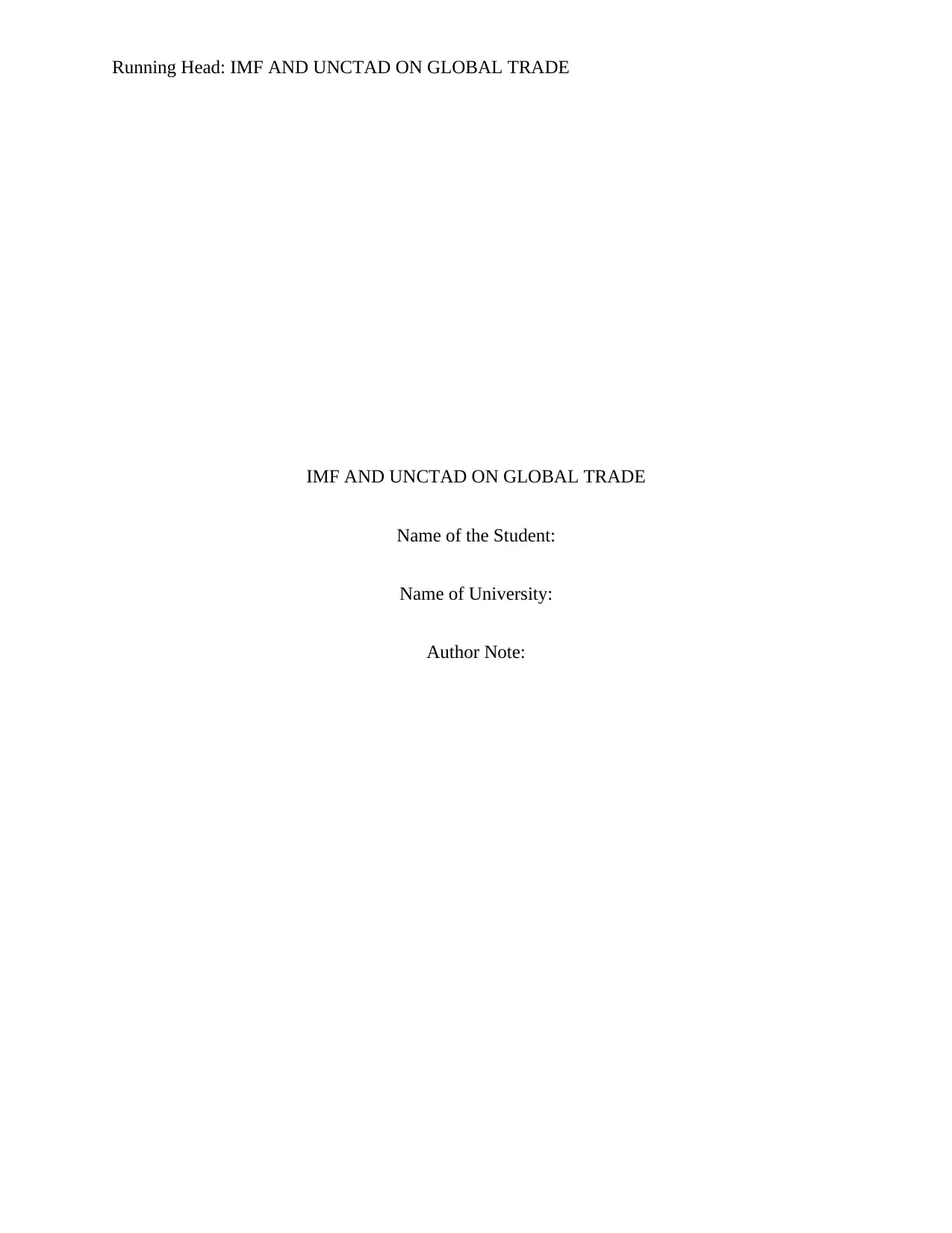
Running Head: IMF AND UNCTAD ON GLOBAL TRADE
IMF AND UNCTAD ON GLOBAL TRADE
Name of the Student:
Name of University:
Author Note:
IMF AND UNCTAD ON GLOBAL TRADE
Name of the Student:
Name of University:
Author Note:
Paraphrase This Document
Need a fresh take? Get an instant paraphrase of this document with our AI Paraphraser
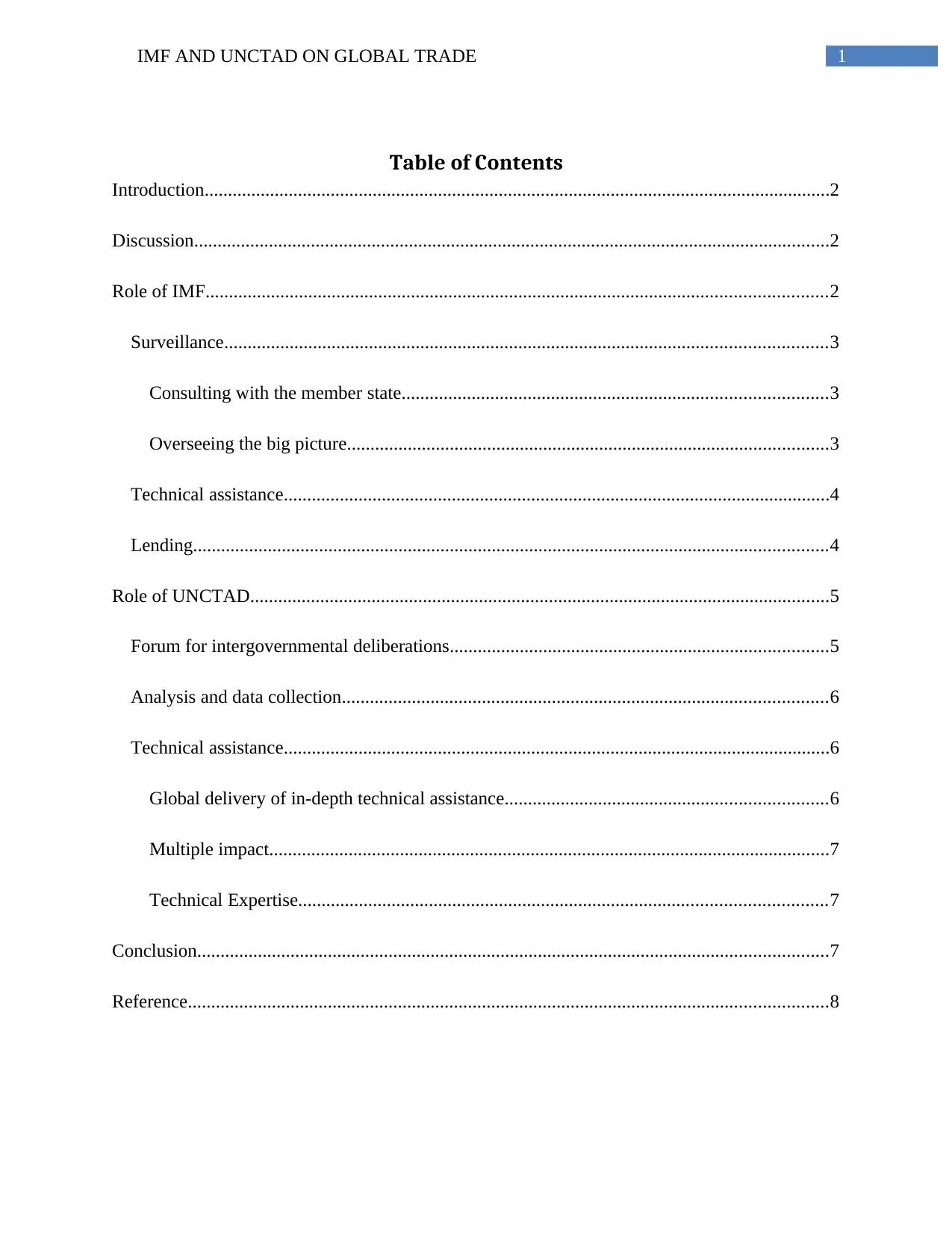
1IMF AND UNCTAD ON GLOBAL TRADE
Table of Contents
Introduction......................................................................................................................................2
Discussion........................................................................................................................................2
Role of IMF.....................................................................................................................................2
Surveillance.................................................................................................................................3
Consulting with the member state...........................................................................................3
Overseeing the big picture.......................................................................................................3
Technical assistance.....................................................................................................................4
Lending........................................................................................................................................4
Role of UNCTAD............................................................................................................................5
Forum for intergovernmental deliberations.................................................................................5
Analysis and data collection........................................................................................................6
Technical assistance.....................................................................................................................6
Global delivery of in-depth technical assistance.....................................................................6
Multiple impact........................................................................................................................7
Technical Expertise.................................................................................................................7
Conclusion.......................................................................................................................................7
Reference.........................................................................................................................................8
Table of Contents
Introduction......................................................................................................................................2
Discussion........................................................................................................................................2
Role of IMF.....................................................................................................................................2
Surveillance.................................................................................................................................3
Consulting with the member state...........................................................................................3
Overseeing the big picture.......................................................................................................3
Technical assistance.....................................................................................................................4
Lending........................................................................................................................................4
Role of UNCTAD............................................................................................................................5
Forum for intergovernmental deliberations.................................................................................5
Analysis and data collection........................................................................................................6
Technical assistance.....................................................................................................................6
Global delivery of in-depth technical assistance.....................................................................6
Multiple impact........................................................................................................................7
Technical Expertise.................................................................................................................7
Conclusion.......................................................................................................................................7
Reference.........................................................................................................................................8
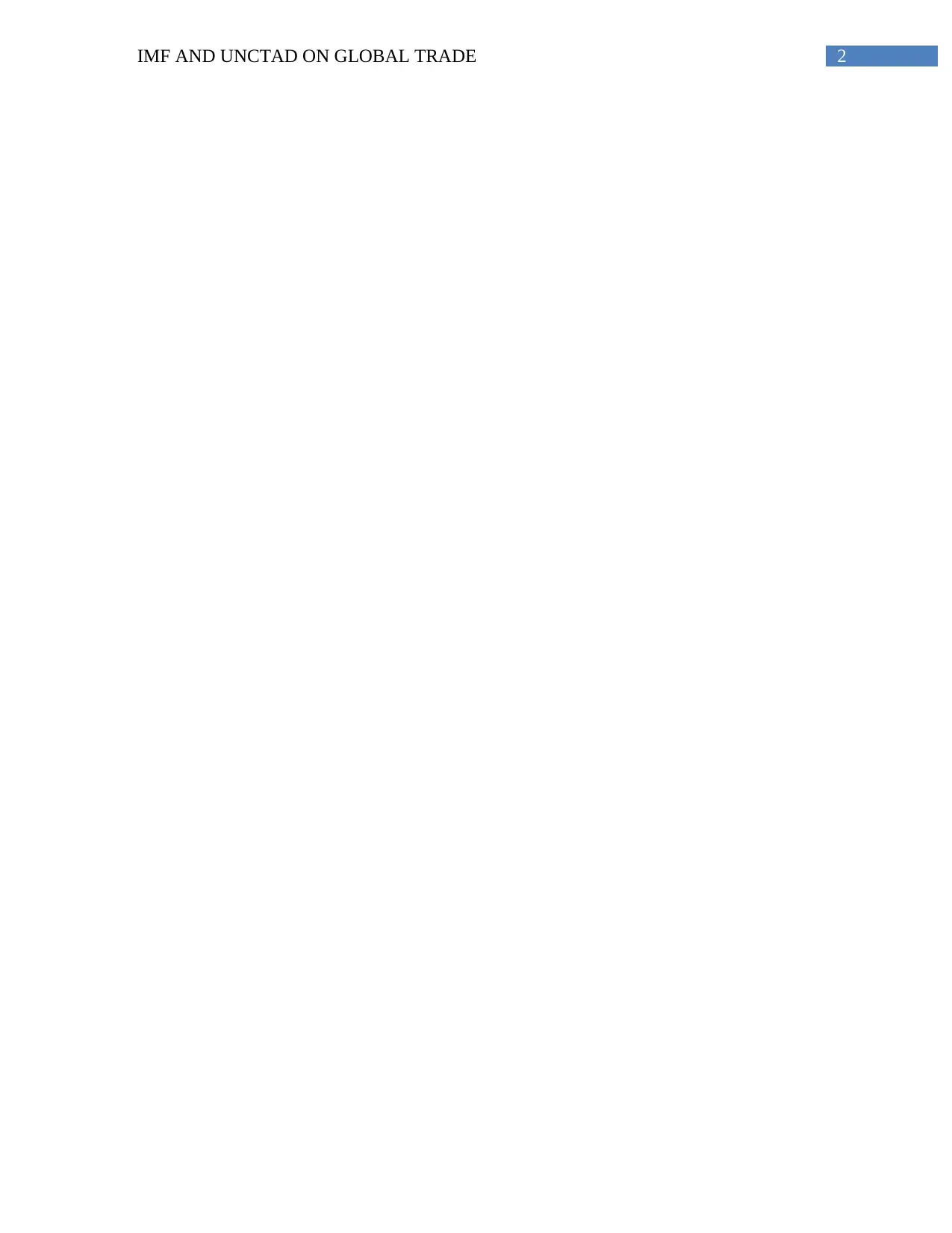
2IMF AND UNCTAD ON GLOBAL TRADE
⊘ This is a preview!⊘
Do you want full access?
Subscribe today to unlock all pages.

Trusted by 1+ million students worldwide
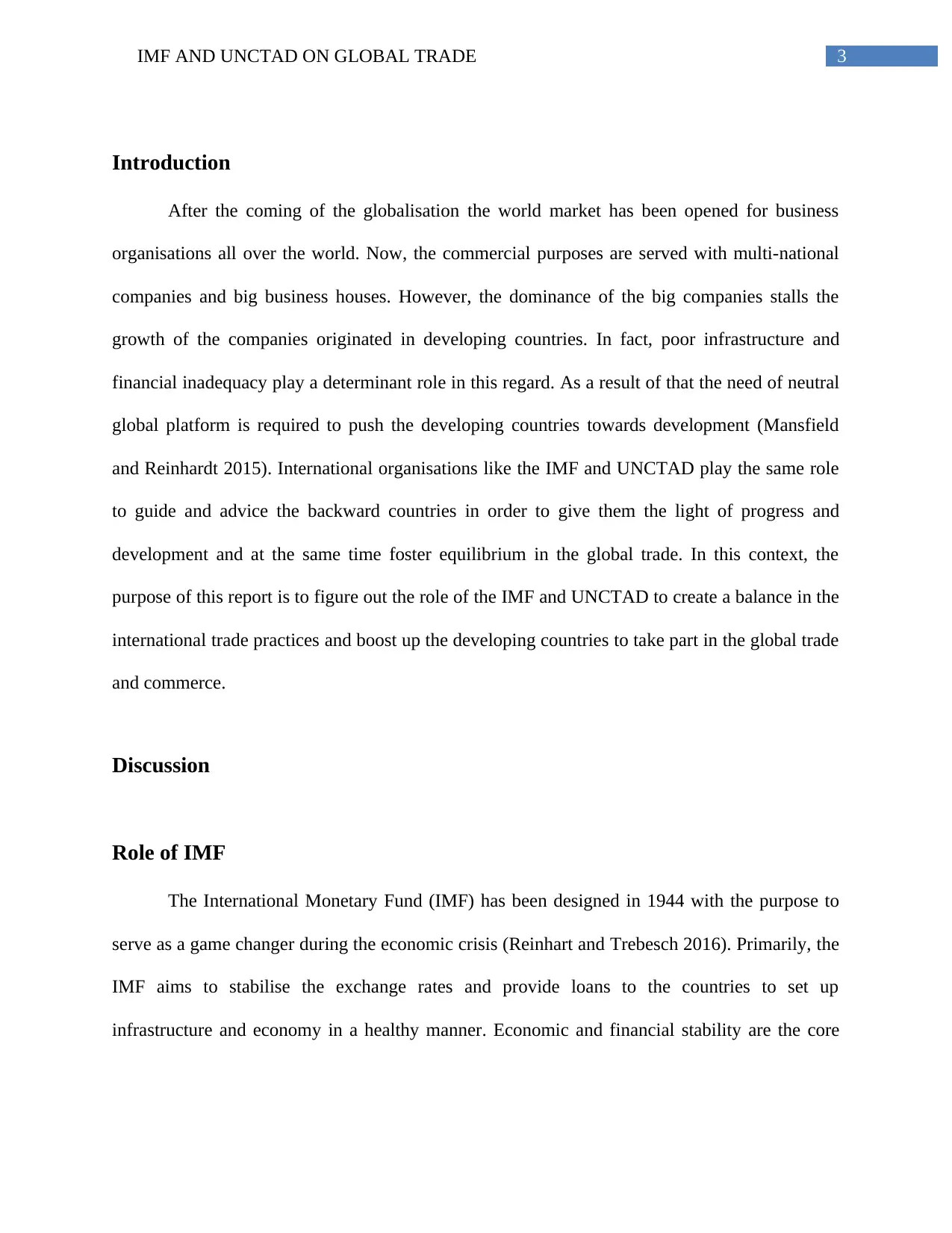
3IMF AND UNCTAD ON GLOBAL TRADE
Introduction
After the coming of the globalisation the world market has been opened for business
organisations all over the world. Now, the commercial purposes are served with multi-national
companies and big business houses. However, the dominance of the big companies stalls the
growth of the companies originated in developing countries. In fact, poor infrastructure and
financial inadequacy play a determinant role in this regard. As a result of that the need of neutral
global platform is required to push the developing countries towards development (Mansfield
and Reinhardt 2015). International organisations like the IMF and UNCTAD play the same role
to guide and advice the backward countries in order to give them the light of progress and
development and at the same time foster equilibrium in the global trade. In this context, the
purpose of this report is to figure out the role of the IMF and UNCTAD to create a balance in the
international trade practices and boost up the developing countries to take part in the global trade
and commerce.
Discussion
Role of IMF
The International Monetary Fund (IMF) has been designed in 1944 with the purpose to
serve as a game changer during the economic crisis (Reinhart and Trebesch 2016). Primarily, the
IMF aims to stabilise the exchange rates and provide loans to the countries to set up
infrastructure and economy in a healthy manner. Economic and financial stability are the core
Introduction
After the coming of the globalisation the world market has been opened for business
organisations all over the world. Now, the commercial purposes are served with multi-national
companies and big business houses. However, the dominance of the big companies stalls the
growth of the companies originated in developing countries. In fact, poor infrastructure and
financial inadequacy play a determinant role in this regard. As a result of that the need of neutral
global platform is required to push the developing countries towards development (Mansfield
and Reinhardt 2015). International organisations like the IMF and UNCTAD play the same role
to guide and advice the backward countries in order to give them the light of progress and
development and at the same time foster equilibrium in the global trade. In this context, the
purpose of this report is to figure out the role of the IMF and UNCTAD to create a balance in the
international trade practices and boost up the developing countries to take part in the global trade
and commerce.
Discussion
Role of IMF
The International Monetary Fund (IMF) has been designed in 1944 with the purpose to
serve as a game changer during the economic crisis (Reinhart and Trebesch 2016). Primarily, the
IMF aims to stabilise the exchange rates and provide loans to the countries to set up
infrastructure and economy in a healthy manner. Economic and financial stability are the core
Paraphrase This Document
Need a fresh take? Get an instant paraphrase of this document with our AI Paraphraser
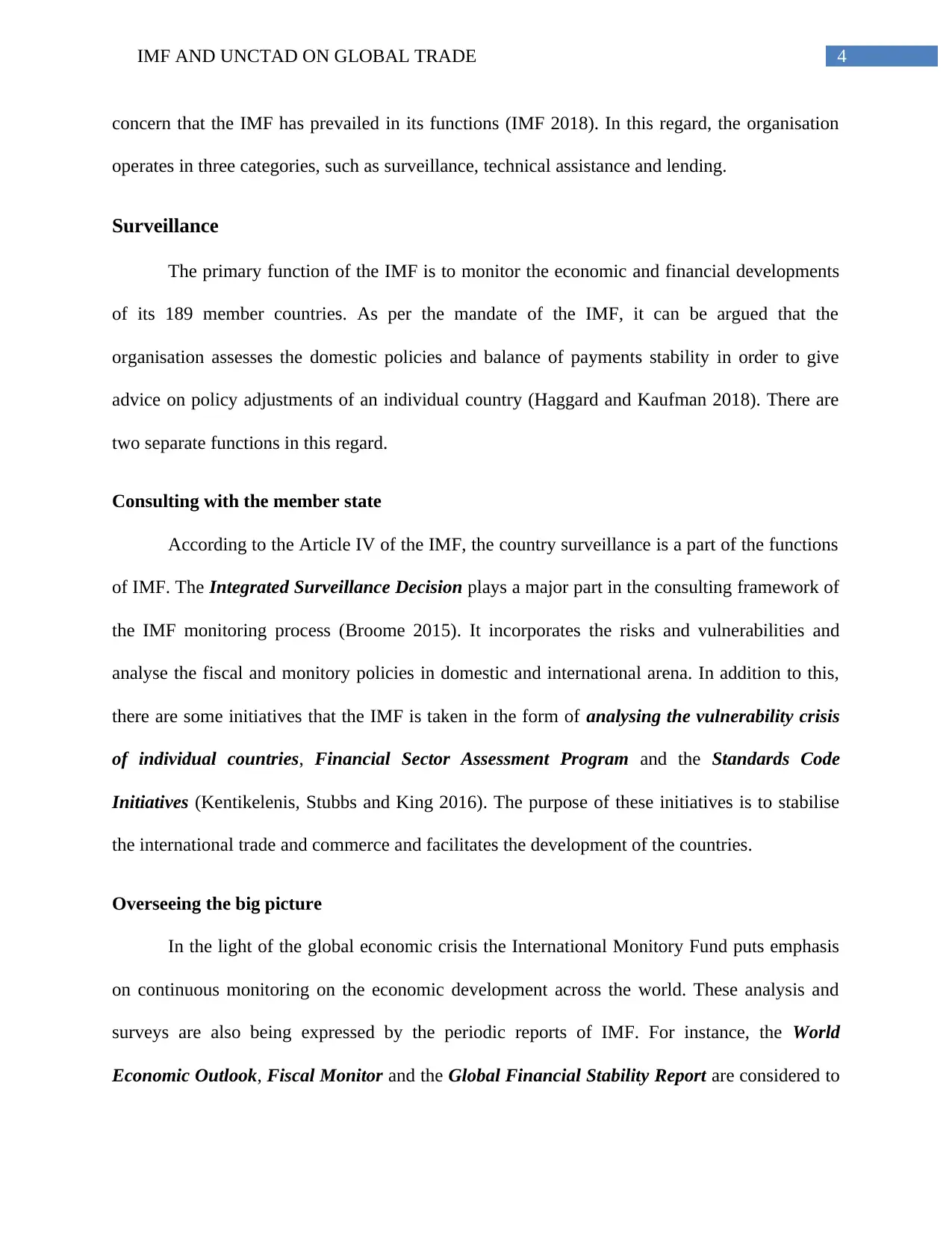
4IMF AND UNCTAD ON GLOBAL TRADE
concern that the IMF has prevailed in its functions (IMF 2018). In this regard, the organisation
operates in three categories, such as surveillance, technical assistance and lending.
Surveillance
The primary function of the IMF is to monitor the economic and financial developments
of its 189 member countries. As per the mandate of the IMF, it can be argued that the
organisation assesses the domestic policies and balance of payments stability in order to give
advice on policy adjustments of an individual country (Haggard and Kaufman 2018). There are
two separate functions in this regard.
Consulting with the member state
According to the Article IV of the IMF, the country surveillance is a part of the functions
of IMF. The Integrated Surveillance Decision plays a major part in the consulting framework of
the IMF monitoring process (Broome 2015). It incorporates the risks and vulnerabilities and
analyse the fiscal and monitory policies in domestic and international arena. In addition to this,
there are some initiatives that the IMF is taken in the form of analysing the vulnerability crisis
of individual countries, Financial Sector Assessment Program and the Standards Code
Initiatives (Kentikelenis, Stubbs and King 2016). The purpose of these initiatives is to stabilise
the international trade and commerce and facilitates the development of the countries.
Overseeing the big picture
In the light of the global economic crisis the International Monitory Fund puts emphasis
on continuous monitoring on the economic development across the world. These analysis and
surveys are also being expressed by the periodic reports of IMF. For instance, the World
Economic Outlook, Fiscal Monitor and the Global Financial Stability Report are considered to
concern that the IMF has prevailed in its functions (IMF 2018). In this regard, the organisation
operates in three categories, such as surveillance, technical assistance and lending.
Surveillance
The primary function of the IMF is to monitor the economic and financial developments
of its 189 member countries. As per the mandate of the IMF, it can be argued that the
organisation assesses the domestic policies and balance of payments stability in order to give
advice on policy adjustments of an individual country (Haggard and Kaufman 2018). There are
two separate functions in this regard.
Consulting with the member state
According to the Article IV of the IMF, the country surveillance is a part of the functions
of IMF. The Integrated Surveillance Decision plays a major part in the consulting framework of
the IMF monitoring process (Broome 2015). It incorporates the risks and vulnerabilities and
analyse the fiscal and monitory policies in domestic and international arena. In addition to this,
there are some initiatives that the IMF is taken in the form of analysing the vulnerability crisis
of individual countries, Financial Sector Assessment Program and the Standards Code
Initiatives (Kentikelenis, Stubbs and King 2016). The purpose of these initiatives is to stabilise
the international trade and commerce and facilitates the development of the countries.
Overseeing the big picture
In the light of the global economic crisis the International Monitory Fund puts emphasis
on continuous monitoring on the economic development across the world. These analysis and
surveys are also being expressed by the periodic reports of IMF. For instance, the World
Economic Outlook, Fiscal Monitor and the Global Financial Stability Report are considered to
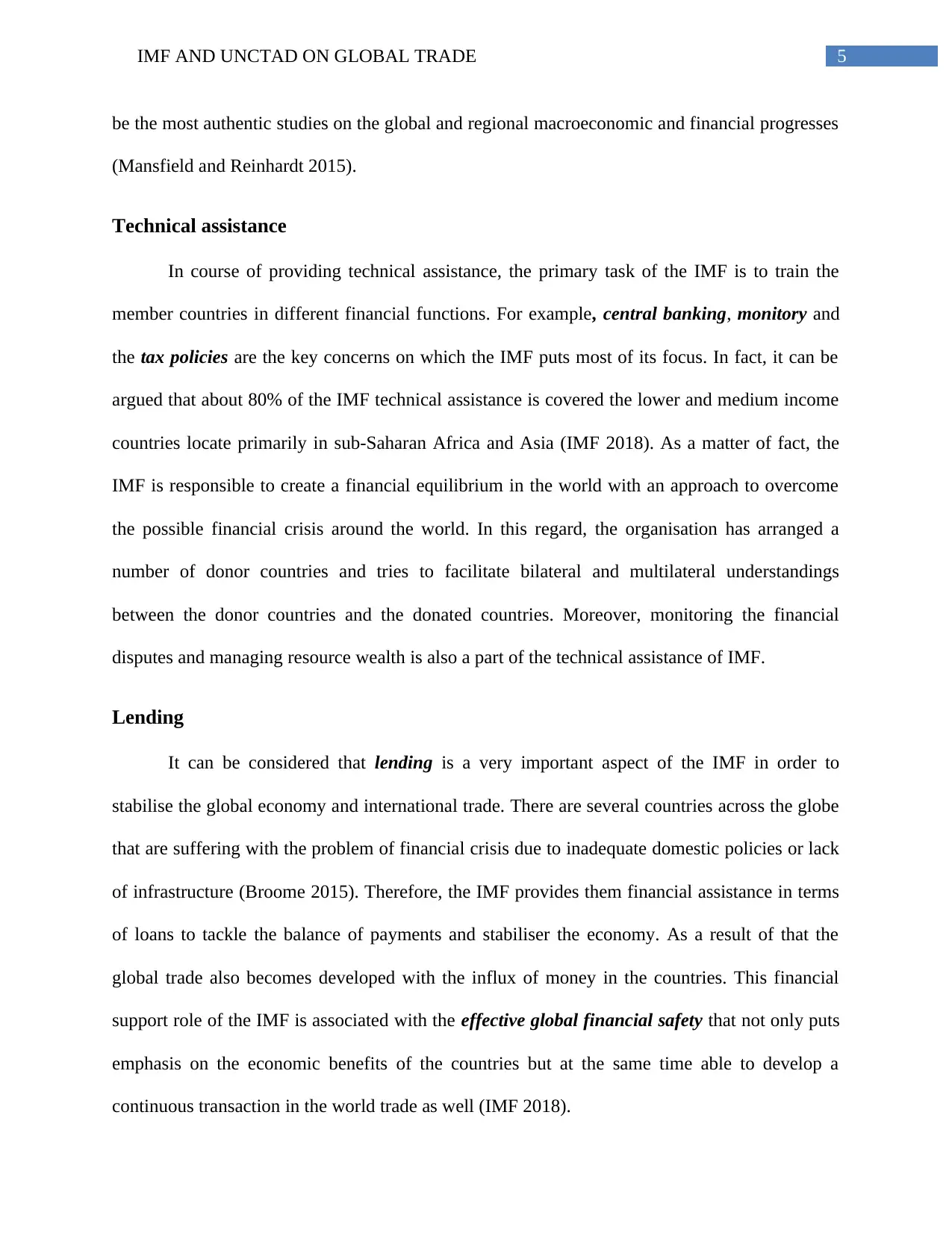
5IMF AND UNCTAD ON GLOBAL TRADE
be the most authentic studies on the global and regional macroeconomic and financial progresses
(Mansfield and Reinhardt 2015).
Technical assistance
In course of providing technical assistance, the primary task of the IMF is to train the
member countries in different financial functions. For example, central banking, monitory and
the tax policies are the key concerns on which the IMF puts most of its focus. In fact, it can be
argued that about 80% of the IMF technical assistance is covered the lower and medium income
countries locate primarily in sub-Saharan Africa and Asia (IMF 2018). As a matter of fact, the
IMF is responsible to create a financial equilibrium in the world with an approach to overcome
the possible financial crisis around the world. In this regard, the organisation has arranged a
number of donor countries and tries to facilitate bilateral and multilateral understandings
between the donor countries and the donated countries. Moreover, monitoring the financial
disputes and managing resource wealth is also a part of the technical assistance of IMF.
Lending
It can be considered that lending is a very important aspect of the IMF in order to
stabilise the global economy and international trade. There are several countries across the globe
that are suffering with the problem of financial crisis due to inadequate domestic policies or lack
of infrastructure (Broome 2015). Therefore, the IMF provides them financial assistance in terms
of loans to tackle the balance of payments and stabiliser the economy. As a result of that the
global trade also becomes developed with the influx of money in the countries. This financial
support role of the IMF is associated with the effective global financial safety that not only puts
emphasis on the economic benefits of the countries but at the same time able to develop a
continuous transaction in the world trade as well (IMF 2018).
be the most authentic studies on the global and regional macroeconomic and financial progresses
(Mansfield and Reinhardt 2015).
Technical assistance
In course of providing technical assistance, the primary task of the IMF is to train the
member countries in different financial functions. For example, central banking, monitory and
the tax policies are the key concerns on which the IMF puts most of its focus. In fact, it can be
argued that about 80% of the IMF technical assistance is covered the lower and medium income
countries locate primarily in sub-Saharan Africa and Asia (IMF 2018). As a matter of fact, the
IMF is responsible to create a financial equilibrium in the world with an approach to overcome
the possible financial crisis around the world. In this regard, the organisation has arranged a
number of donor countries and tries to facilitate bilateral and multilateral understandings
between the donor countries and the donated countries. Moreover, monitoring the financial
disputes and managing resource wealth is also a part of the technical assistance of IMF.
Lending
It can be considered that lending is a very important aspect of the IMF in order to
stabilise the global economy and international trade. There are several countries across the globe
that are suffering with the problem of financial crisis due to inadequate domestic policies or lack
of infrastructure (Broome 2015). Therefore, the IMF provides them financial assistance in terms
of loans to tackle the balance of payments and stabiliser the economy. As a result of that the
global trade also becomes developed with the influx of money in the countries. This financial
support role of the IMF is associated with the effective global financial safety that not only puts
emphasis on the economic benefits of the countries but at the same time able to develop a
continuous transaction in the world trade as well (IMF 2018).
⊘ This is a preview!⊘
Do you want full access?
Subscribe today to unlock all pages.

Trusted by 1+ million students worldwide
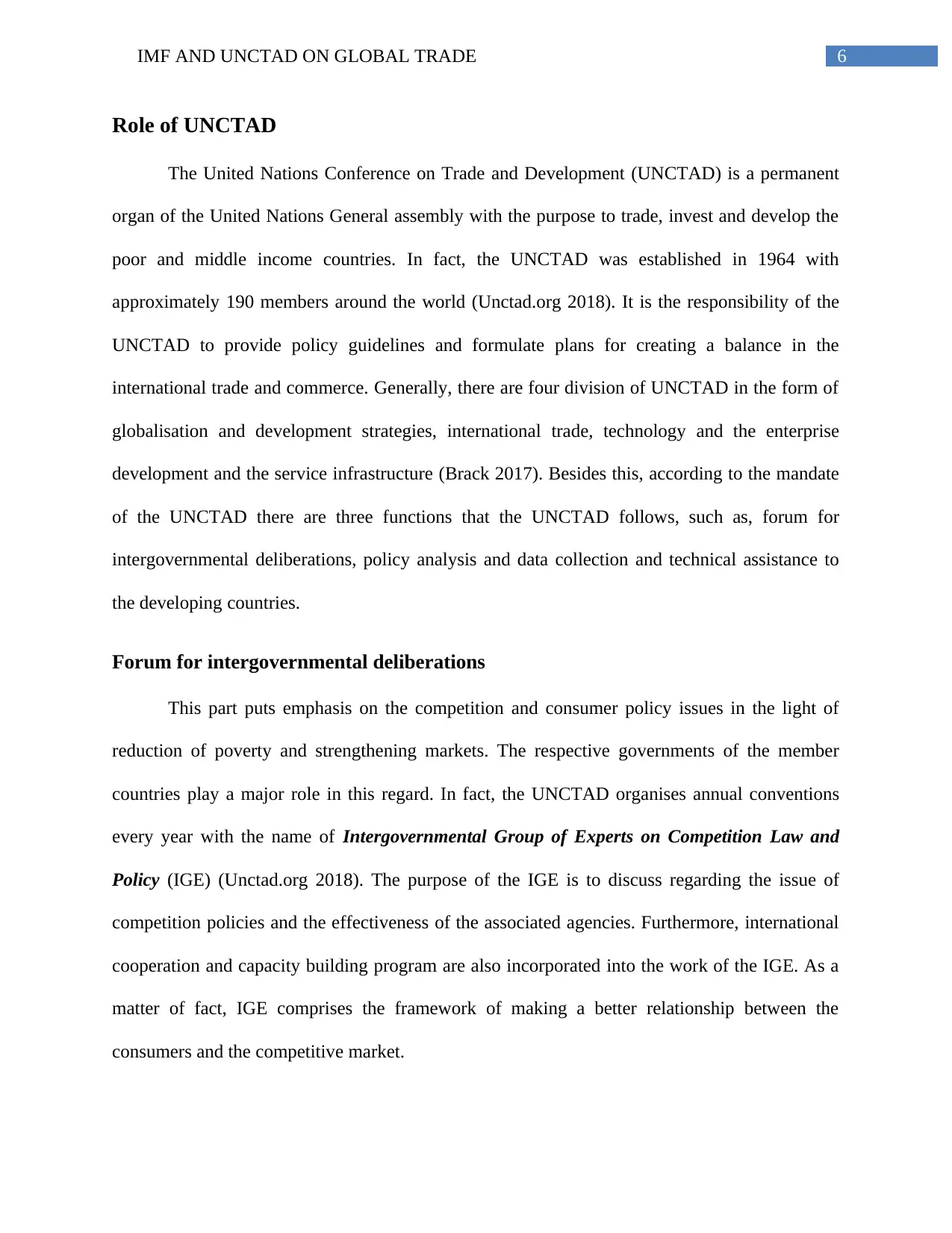
6IMF AND UNCTAD ON GLOBAL TRADE
Role of UNCTAD
The United Nations Conference on Trade and Development (UNCTAD) is a permanent
organ of the United Nations General assembly with the purpose to trade, invest and develop the
poor and middle income countries. In fact, the UNCTAD was established in 1964 with
approximately 190 members around the world (Unctad.org 2018). It is the responsibility of the
UNCTAD to provide policy guidelines and formulate plans for creating a balance in the
international trade and commerce. Generally, there are four division of UNCTAD in the form of
globalisation and development strategies, international trade, technology and the enterprise
development and the service infrastructure (Brack 2017). Besides this, according to the mandate
of the UNCTAD there are three functions that the UNCTAD follows, such as, forum for
intergovernmental deliberations, policy analysis and data collection and technical assistance to
the developing countries.
Forum for intergovernmental deliberations
This part puts emphasis on the competition and consumer policy issues in the light of
reduction of poverty and strengthening markets. The respective governments of the member
countries play a major role in this regard. In fact, the UNCTAD organises annual conventions
every year with the name of Intergovernmental Group of Experts on Competition Law and
Policy (IGE) (Unctad.org 2018). The purpose of the IGE is to discuss regarding the issue of
competition policies and the effectiveness of the associated agencies. Furthermore, international
cooperation and capacity building program are also incorporated into the work of the IGE. As a
matter of fact, IGE comprises the framework of making a better relationship between the
consumers and the competitive market.
Role of UNCTAD
The United Nations Conference on Trade and Development (UNCTAD) is a permanent
organ of the United Nations General assembly with the purpose to trade, invest and develop the
poor and middle income countries. In fact, the UNCTAD was established in 1964 with
approximately 190 members around the world (Unctad.org 2018). It is the responsibility of the
UNCTAD to provide policy guidelines and formulate plans for creating a balance in the
international trade and commerce. Generally, there are four division of UNCTAD in the form of
globalisation and development strategies, international trade, technology and the enterprise
development and the service infrastructure (Brack 2017). Besides this, according to the mandate
of the UNCTAD there are three functions that the UNCTAD follows, such as, forum for
intergovernmental deliberations, policy analysis and data collection and technical assistance to
the developing countries.
Forum for intergovernmental deliberations
This part puts emphasis on the competition and consumer policy issues in the light of
reduction of poverty and strengthening markets. The respective governments of the member
countries play a major role in this regard. In fact, the UNCTAD organises annual conventions
every year with the name of Intergovernmental Group of Experts on Competition Law and
Policy (IGE) (Unctad.org 2018). The purpose of the IGE is to discuss regarding the issue of
competition policies and the effectiveness of the associated agencies. Furthermore, international
cooperation and capacity building program are also incorporated into the work of the IGE. As a
matter of fact, IGE comprises the framework of making a better relationship between the
consumers and the competitive market.
Paraphrase This Document
Need a fresh take? Get an instant paraphrase of this document with our AI Paraphraser
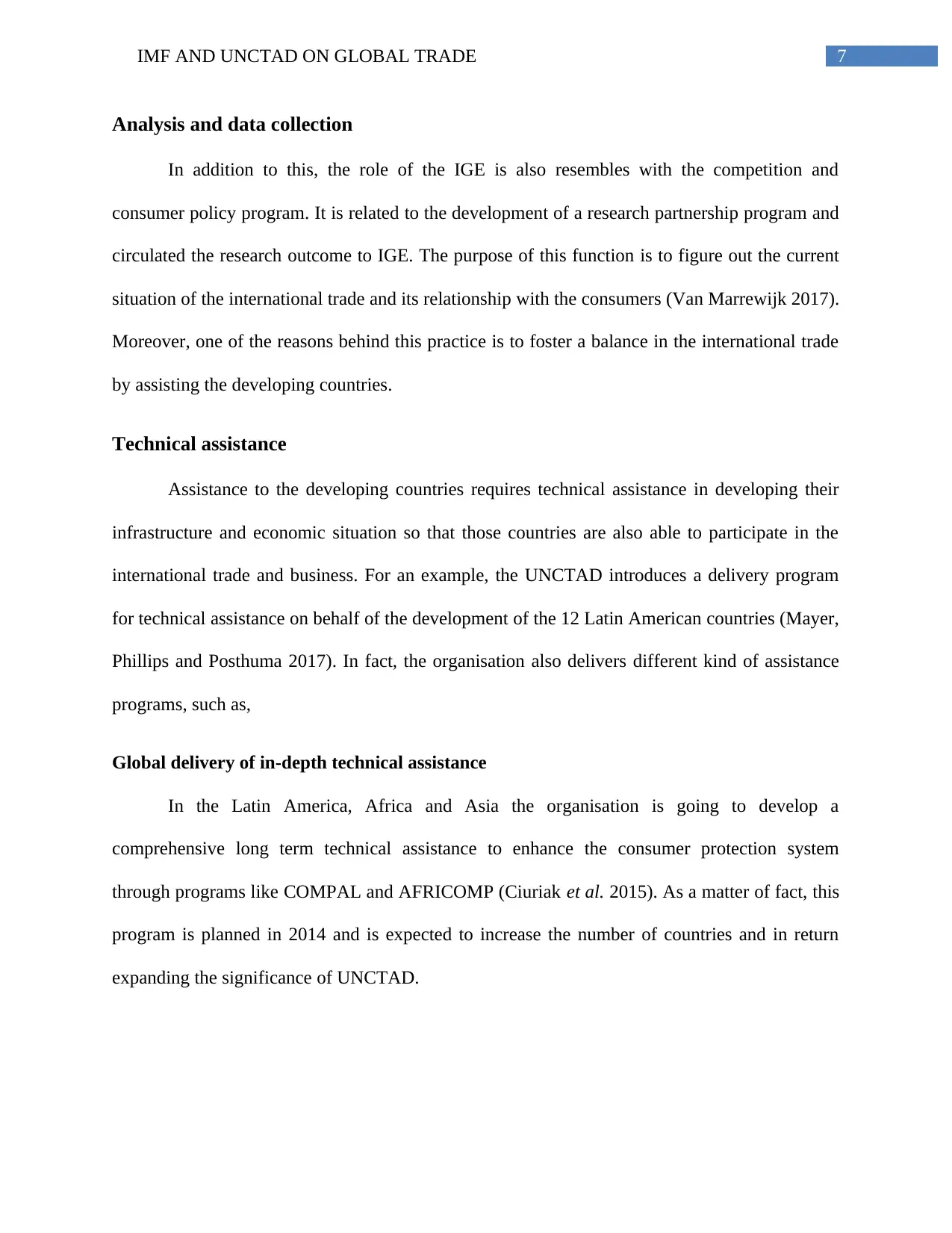
7IMF AND UNCTAD ON GLOBAL TRADE
Analysis and data collection
In addition to this, the role of the IGE is also resembles with the competition and
consumer policy program. It is related to the development of a research partnership program and
circulated the research outcome to IGE. The purpose of this function is to figure out the current
situation of the international trade and its relationship with the consumers (Van Marrewijk 2017).
Moreover, one of the reasons behind this practice is to foster a balance in the international trade
by assisting the developing countries.
Technical assistance
Assistance to the developing countries requires technical assistance in developing their
infrastructure and economic situation so that those countries are also able to participate in the
international trade and business. For an example, the UNCTAD introduces a delivery program
for technical assistance on behalf of the development of the 12 Latin American countries (Mayer,
Phillips and Posthuma 2017). In fact, the organisation also delivers different kind of assistance
programs, such as,
Global delivery of in-depth technical assistance
In the Latin America, Africa and Asia the organisation is going to develop a
comprehensive long term technical assistance to enhance the consumer protection system
through programs like COMPAL and AFRICOMP (Ciuriak et al. 2015). As a matter of fact, this
program is planned in 2014 and is expected to increase the number of countries and in return
expanding the significance of UNCTAD.
Analysis and data collection
In addition to this, the role of the IGE is also resembles with the competition and
consumer policy program. It is related to the development of a research partnership program and
circulated the research outcome to IGE. The purpose of this function is to figure out the current
situation of the international trade and its relationship with the consumers (Van Marrewijk 2017).
Moreover, one of the reasons behind this practice is to foster a balance in the international trade
by assisting the developing countries.
Technical assistance
Assistance to the developing countries requires technical assistance in developing their
infrastructure and economic situation so that those countries are also able to participate in the
international trade and business. For an example, the UNCTAD introduces a delivery program
for technical assistance on behalf of the development of the 12 Latin American countries (Mayer,
Phillips and Posthuma 2017). In fact, the organisation also delivers different kind of assistance
programs, such as,
Global delivery of in-depth technical assistance
In the Latin America, Africa and Asia the organisation is going to develop a
comprehensive long term technical assistance to enhance the consumer protection system
through programs like COMPAL and AFRICOMP (Ciuriak et al. 2015). As a matter of fact, this
program is planned in 2014 and is expected to increase the number of countries and in return
expanding the significance of UNCTAD.
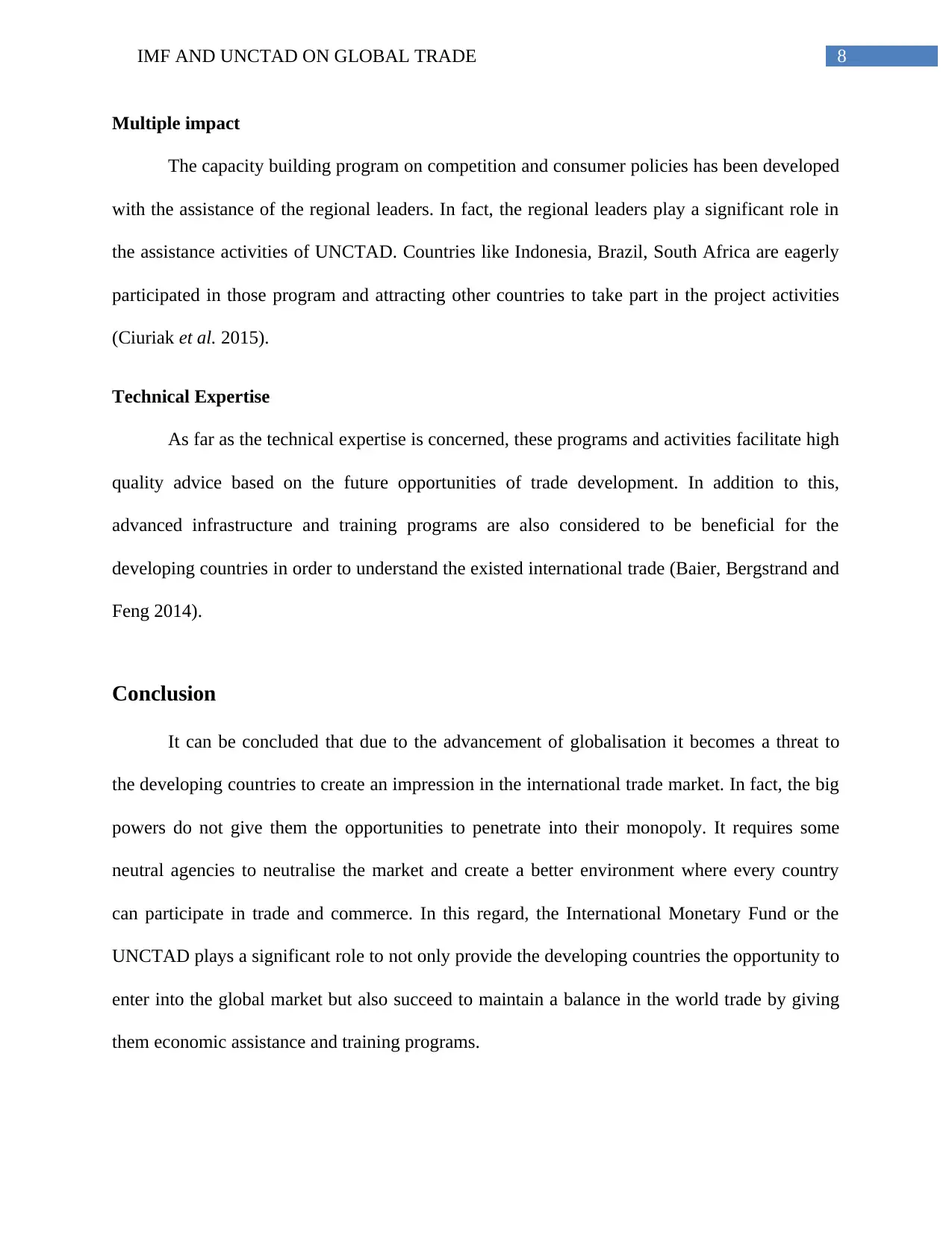
8IMF AND UNCTAD ON GLOBAL TRADE
Multiple impact
The capacity building program on competition and consumer policies has been developed
with the assistance of the regional leaders. In fact, the regional leaders play a significant role in
the assistance activities of UNCTAD. Countries like Indonesia, Brazil, South Africa are eagerly
participated in those program and attracting other countries to take part in the project activities
(Ciuriak et al. 2015).
Technical Expertise
As far as the technical expertise is concerned, these programs and activities facilitate high
quality advice based on the future opportunities of trade development. In addition to this,
advanced infrastructure and training programs are also considered to be beneficial for the
developing countries in order to understand the existed international trade (Baier, Bergstrand and
Feng 2014).
Conclusion
It can be concluded that due to the advancement of globalisation it becomes a threat to
the developing countries to create an impression in the international trade market. In fact, the big
powers do not give them the opportunities to penetrate into their monopoly. It requires some
neutral agencies to neutralise the market and create a better environment where every country
can participate in trade and commerce. In this regard, the International Monetary Fund or the
UNCTAD plays a significant role to not only provide the developing countries the opportunity to
enter into the global market but also succeed to maintain a balance in the world trade by giving
them economic assistance and training programs.
Multiple impact
The capacity building program on competition and consumer policies has been developed
with the assistance of the regional leaders. In fact, the regional leaders play a significant role in
the assistance activities of UNCTAD. Countries like Indonesia, Brazil, South Africa are eagerly
participated in those program and attracting other countries to take part in the project activities
(Ciuriak et al. 2015).
Technical Expertise
As far as the technical expertise is concerned, these programs and activities facilitate high
quality advice based on the future opportunities of trade development. In addition to this,
advanced infrastructure and training programs are also considered to be beneficial for the
developing countries in order to understand the existed international trade (Baier, Bergstrand and
Feng 2014).
Conclusion
It can be concluded that due to the advancement of globalisation it becomes a threat to
the developing countries to create an impression in the international trade market. In fact, the big
powers do not give them the opportunities to penetrate into their monopoly. It requires some
neutral agencies to neutralise the market and create a better environment where every country
can participate in trade and commerce. In this regard, the International Monetary Fund or the
UNCTAD plays a significant role to not only provide the developing countries the opportunity to
enter into the global market but also succeed to maintain a balance in the world trade by giving
them economic assistance and training programs.
⊘ This is a preview!⊘
Do you want full access?
Subscribe today to unlock all pages.

Trusted by 1+ million students worldwide
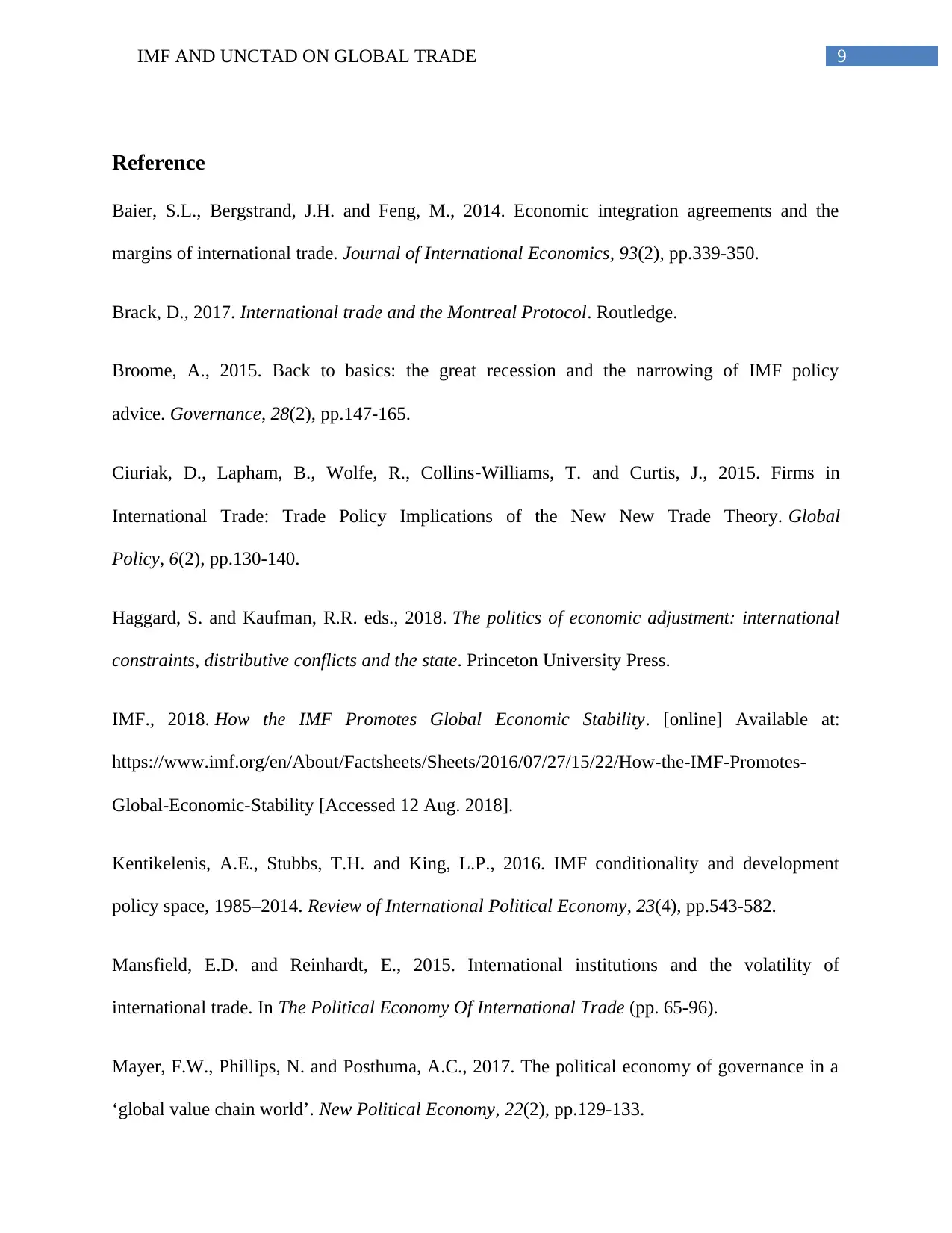
9IMF AND UNCTAD ON GLOBAL TRADE
Reference
Baier, S.L., Bergstrand, J.H. and Feng, M., 2014. Economic integration agreements and the
margins of international trade. Journal of International Economics, 93(2), pp.339-350.
Brack, D., 2017. International trade and the Montreal Protocol. Routledge.
Broome, A., 2015. Back to basics: the great recession and the narrowing of IMF policy
advice. Governance, 28(2), pp.147-165.
Ciuriak, D., Lapham, B., Wolfe, R., Collins‐Williams, T. and Curtis, J., 2015. Firms in
International Trade: Trade Policy Implications of the New New Trade Theory. Global
Policy, 6(2), pp.130-140.
Haggard, S. and Kaufman, R.R. eds., 2018. The politics of economic adjustment: international
constraints, distributive conflicts and the state. Princeton University Press.
IMF., 2018. How the IMF Promotes Global Economic Stability. [online] Available at:
https://www.imf.org/en/About/Factsheets/Sheets/2016/07/27/15/22/How-the-IMF-Promotes-
Global-Economic-Stability [Accessed 12 Aug. 2018].
Kentikelenis, A.E., Stubbs, T.H. and King, L.P., 2016. IMF conditionality and development
policy space, 1985–2014. Review of International Political Economy, 23(4), pp.543-582.
Mansfield, E.D. and Reinhardt, E., 2015. International institutions and the volatility of
international trade. In The Political Economy Of International Trade (pp. 65-96).
Mayer, F.W., Phillips, N. and Posthuma, A.C., 2017. The political economy of governance in a
‘global value chain world’. New Political Economy, 22(2), pp.129-133.
Reference
Baier, S.L., Bergstrand, J.H. and Feng, M., 2014. Economic integration agreements and the
margins of international trade. Journal of International Economics, 93(2), pp.339-350.
Brack, D., 2017. International trade and the Montreal Protocol. Routledge.
Broome, A., 2015. Back to basics: the great recession and the narrowing of IMF policy
advice. Governance, 28(2), pp.147-165.
Ciuriak, D., Lapham, B., Wolfe, R., Collins‐Williams, T. and Curtis, J., 2015. Firms in
International Trade: Trade Policy Implications of the New New Trade Theory. Global
Policy, 6(2), pp.130-140.
Haggard, S. and Kaufman, R.R. eds., 2018. The politics of economic adjustment: international
constraints, distributive conflicts and the state. Princeton University Press.
IMF., 2018. How the IMF Promotes Global Economic Stability. [online] Available at:
https://www.imf.org/en/About/Factsheets/Sheets/2016/07/27/15/22/How-the-IMF-Promotes-
Global-Economic-Stability [Accessed 12 Aug. 2018].
Kentikelenis, A.E., Stubbs, T.H. and King, L.P., 2016. IMF conditionality and development
policy space, 1985–2014. Review of International Political Economy, 23(4), pp.543-582.
Mansfield, E.D. and Reinhardt, E., 2015. International institutions and the volatility of
international trade. In The Political Economy Of International Trade (pp. 65-96).
Mayer, F.W., Phillips, N. and Posthuma, A.C., 2017. The political economy of governance in a
‘global value chain world’. New Political Economy, 22(2), pp.129-133.
Paraphrase This Document
Need a fresh take? Get an instant paraphrase of this document with our AI Paraphraser
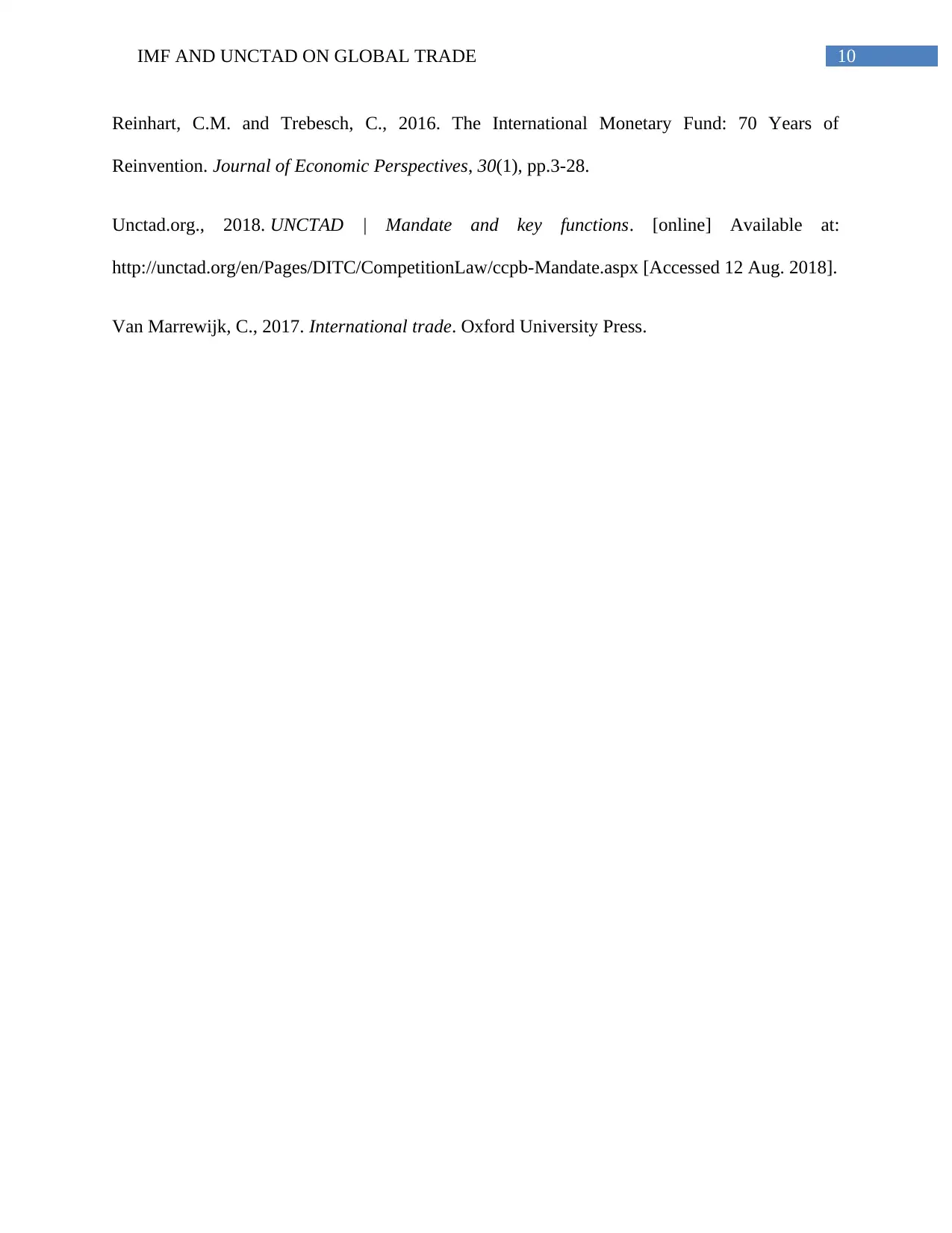
10IMF AND UNCTAD ON GLOBAL TRADE
Reinhart, C.M. and Trebesch, C., 2016. The International Monetary Fund: 70 Years of
Reinvention. Journal of Economic Perspectives, 30(1), pp.3-28.
Unctad.org., 2018. UNCTAD | Mandate and key functions. [online] Available at:
http://unctad.org/en/Pages/DITC/CompetitionLaw/ccpb-Mandate.aspx [Accessed 12 Aug. 2018].
Van Marrewijk, C., 2017. International trade. Oxford University Press.
Reinhart, C.M. and Trebesch, C., 2016. The International Monetary Fund: 70 Years of
Reinvention. Journal of Economic Perspectives, 30(1), pp.3-28.
Unctad.org., 2018. UNCTAD | Mandate and key functions. [online] Available at:
http://unctad.org/en/Pages/DITC/CompetitionLaw/ccpb-Mandate.aspx [Accessed 12 Aug. 2018].
Van Marrewijk, C., 2017. International trade. Oxford University Press.
1 out of 11
Related Documents
Your All-in-One AI-Powered Toolkit for Academic Success.
+13062052269
info@desklib.com
Available 24*7 on WhatsApp / Email
![[object Object]](/_next/static/media/star-bottom.7253800d.svg)
Unlock your academic potential
Copyright © 2020–2026 A2Z Services. All Rights Reserved. Developed and managed by ZUCOL.





